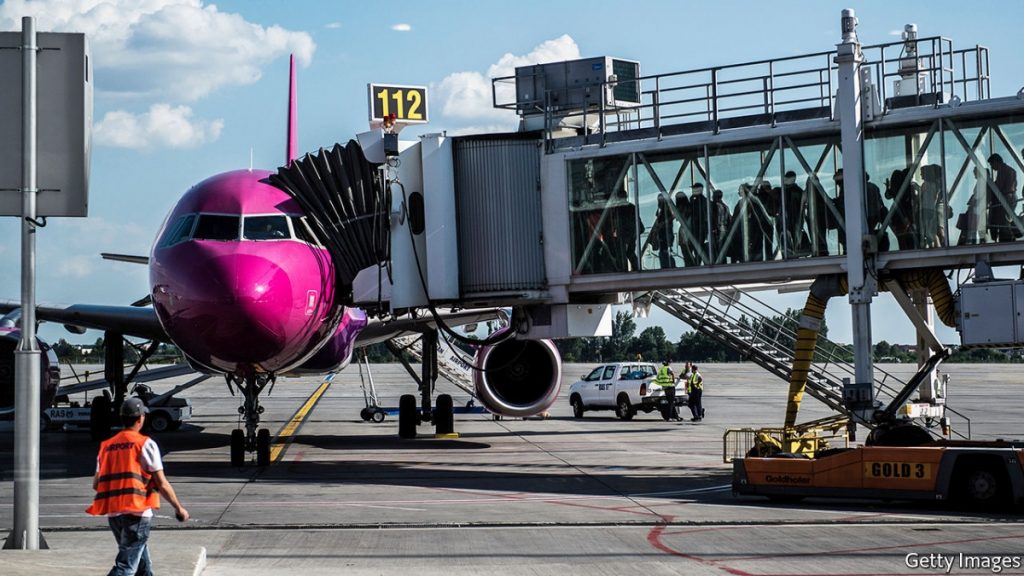
The Hungarian affordable provider looks much better positioned than rivals to flourish
T HE STATE OF MIND among airline company managers can seem evenly bleak. For excellent reason: flight may not return to pre-pandemic levels until2024 Not a week goes by without an airline company sacking countless employees. Against this gloom, Jozsef Varadi, who runs Wizz Air, cuts an adventurous figure. While other airline companies cancel and defer orders for brand-new planes and put expansion plans on ice, he wishes to increase his fleet from 127 aircrafts to 160 by 2022 and double guest numbers to 80 m by2025 He believes the Hungarian inexpensive provider, established 17 years ago and now Europe’s third-biggest behind Ryanair and EasyJet, will not just endure covid-19 however thrive.
Can the strategy fly? “The odds are it will,” says Keith McMullan of Air Travel Strategy, a consultancy. Wizz Air handled to report a 19%rise in revenues in the 12 months to March, to EUR2.8 bn ($ 3.1 bn). Net revenues doubled year on year, to EUR281 m. In spite of inescapable losses this year, it has sustained less covid-19 damage than competitors.
Luck played a role. Wizz Air’s customers are on average 32 years of ages– younger than those of rivals and less fearful of the infection. It caters to lots of main and eastern Europeans operating in the west, who are eager to fly house frequently. Wizz Air’s smaller fleet, less than a third the size of Ryanair’s and half of EasyJet’s, suggested it could keep a bigger share of its aircraft in the air.
Wizz Air’s strength is not all down to good fortune. Mr Varadi’s concentrate on costs assisted, too. He claims Wizz Air’s are the most affordable in business, thanks generally to the industry’s biggest fleet of super-efficient Plane A321 s (though he got lucky here, too, by not selecting Boeing’s rival 737 MAX jets, the grounding of which after two deadly crashes has actually postponed deliveries to huge purchasers like Ryanair). Utilizing the greatest version of the single-aisle workhorse has assisted to spread out expenditures amongst more travelers. One quote put Wizz Air’s system costs at half those of EasyJet, an airline company that increasingly resembles the tradition providers it once looked for to subvert. And Mr Varadi has pulled this off without irritating passengers or getting a Ryanair-like credibility for stinginess.
Now, thanks to mass lay-offs of pilots, cabin team and other personnel, labour costs are toppling. Empty airports are charming carriers with cheap landing slots and discounts on other charges. That has actually permitted Wizz Air to set up 10 new bases in the past three months, including at London’s Gatwick airport, along with in Germany, Albania and Russia. Plans to serve the Persian Gulf in a joint endeavor with Abu Dhabi’s sovereign-wealth fund stay on track.
Things might still fail. On September 1st, as European countries reimposed travel constraints, Wizz Air tempered its plans to go back to 80?pacity next quarter. It is now going for 60%, still better than 45%approximately for many European rivals. Its share rate is below its peak in mid-February, however back where it was at the start of the year (see chart). Mr Varadi states Wizz Air’s EUR1.5 bn in money would last 20 months even if all its planes stop flying. He delights in the possibility to “arrange winners from losers”. No points for thinking which group he thinks his firm belongs to. ■
Editor’s note: Some of our covid-19 protection is free for readers of The Financial Expert Today, our everyday newsletter For more stories and our pandemic tracker, see our center
This post appeared in business area of the print edition under the headline “Rising in the east”
